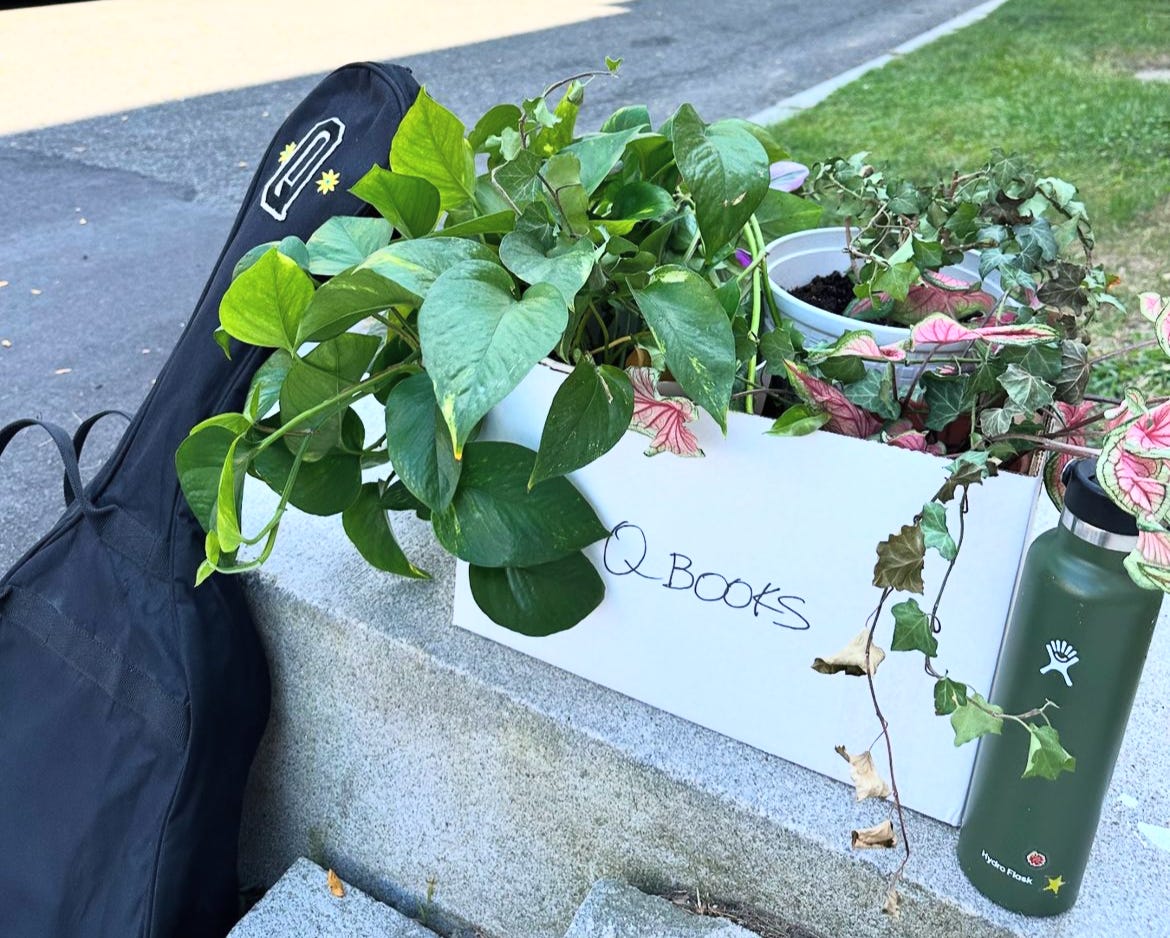The rental car is packed with Q’s stuff to take back to college, but it seems less full than last year. I’m not sure why this thought nags — looking through the rearview mirror I have only a modest rectangle of open window to check what’s behind us, and even that’s through leaves spilling out of a box of plants. I kept going through the list in my head as we took the FDR Drive north, and it wasn’t until we curved onto the Hutchinson Parkway that I understood: When we dropped Q off at college for the first time last year, we packed so as to fortify her against any conceivable need. As a sophomore, Q pretty much knows what she needs to be her kind of student, which turns out not to be everything.
These are the days of going back. The summer has burnt itself out, and the sun has begun to move in the mornings and evenings into its fall slouch. And, of course, school has arrived. I’ve worked in higher education for nearly 30 years, and its rhythms have become circadian for me. The end of August means the beginning of the semester and the sense of possibility and excitement that comes with it, the busyness and messiness of the making of selves. Q found a home at her college in the woods, and though she likes the bagels and Variety Coffee here in New York, she has been looking forward to the smaller town and the chance, as she puts it, to again be studious. This semester she’s taking classes in ethics, creative writing (in English and Spanish), and Chaucer. She has gotten snagged by questions of justice and injustice, how she can think about them, and what she can do about them — subjects so difficult to keep one’s mind on without classes and experts and, especially, time.
M, my 21-year-old son, is going back too. He took a break from college after a year and a half on the other side of the country. His sense of possibility and excitement as a first-time freshman ran into a program that didn’t fit him and the brutalist geography of Los Angeles, and he needed time to think. During that 18-month break, he’s been a working musician in New York with all that that entails: playing shows, recording and releasing music, hustling for fans and listeners, working retail jobs, looking for a community, trying to figure stuff out. It was hard, as you might expect, to arrive at the decision not to go back to LA, to not just stop but quit. It’s so easy — too easy in fact — to see quitting as just another name for failure, even when (in this case) it’s a species of courage. He ultimately decided to return to school but here in New York pursuing a degree that lets him be both a student and an artist while also a (literal) rock star.
The week before M and Q went back to college, M was swamped. He was trying to work as many retail-job hours as possible to bank as much money as possible, he had shows and band practice, friends to see before they left for their own colleges, and several full days of new-student orientation. He looked exhausted. I asked him how he was doing, and he said, “I can’t fit all my life inside my life.”
I’ve been unable to stop thinking about his way of putting things. In one sense, it’s straightforward — M has so many things that he wants to do (make music, make money, have a social life, be a student, be an artist, be happy) and not enough time to do it all as he wishes. This straightforward reading invites a straightforward solution — compromise on what you want to do, and your life will fit more neatly inside your life.
But the easy reading is too easy. So much of our existence, the necessity and effort of it, conspires against a big life. Which is why college years often feel so special: This fall M, like Q and so many other students, are dedicating themselves to the radical courage that learning demands. To learn, after all, is to embody the premise that one can be improved, constructively confounded, enlarged. It is an admission, again radical, that we are the kind of creatures that always remain unfinished. I celebrate everyone who, like M and Q, can’t fit all their lives inside their lives, and who respond by choosing, against so many things, to make their lives bigger.




I recently learned Thomas Pynchon’s term for this phenomenon: increasing one’s “personal density.”
Enjoyed this, thanks Roblin.